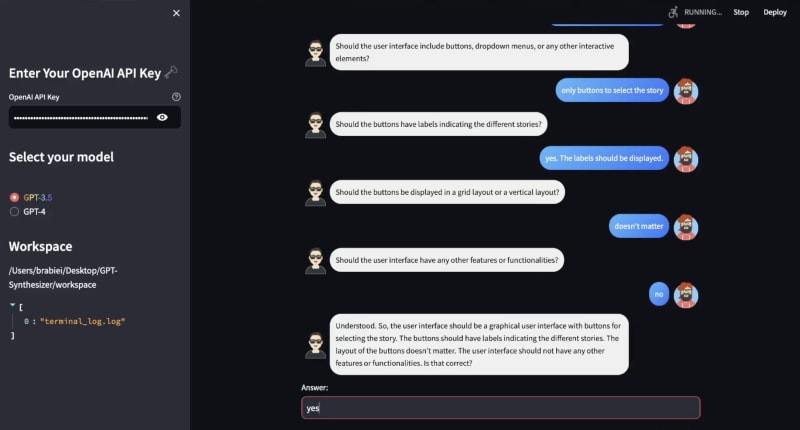I am pleased to announce that we released v0.0.4 of GPT-Synthesizer a few days ago. This release has a lot of quality-of-life improvements as was requested by some users.
The main update is that we now have a web-based GUI using Streamlit.
Release Notes v0.0.4
Streamlit user interface:
- The user can now choose the GPT model via the UI.
- Generated code base is shown in the UI.
- Quality of life improvements for interaction with GPT-Synthesizer.
More bug fixes with the code generation.
How to run the Streamlit version:
- Start GPT Synthesizer by typing gpt-synthesizer-streamlit in the terminal.
- Input your OpenAI API key in the sidebar
- Select the model you wish to use in the sidebar
Demo: GPT-Synthesizer Release v0.0.4 streamlit demo: calculator
How GPT-Synthesizer works
The design philosophy of GPT Synthesizer is rooted in the core belief that a single prompt is not enough to build a complete codebase for complex software. This is mainly due to the fact that, even in the presence of powerful LLMs, there are still many crucial details in the design specification that cannot be effectively captured in a single prompt. Attempting to include every bit of detail in a single prompt, if not impossible, would cause a loss of efficiency of the LLM engine. Powered by LangChain, GPT Synthesizer captures the design specification, step by step, through an AI-directed dialogue that explores the design space with the user.
GPT Synthesizer interprets the initial prompt as a high-level description of a programming task. Then, through a process, which we named “prompt synthesis”, GPT Synthesizer compiles the initial prompt into multiple program components that the user might need for implementation. This step essentially turns 'unknown unknowns' into 'known unknowns', which can be very helpful for novice programmers who want to understand the overall flow of their desired implementation. Next, GPT Synthesizer and the user collaboratively find out the design details that will be used in the implementation of each program component.
For a deep dive in how GPT-synthesizer works, read this article.
About GPT-Synthesizer
GPT-Synthesizer is a free open-source tool, under MIT license, that can help with your software design and code generation for personal or commercial use. We made GPT-Synthesizer open source hoping that it would benefit others who are interested in this domain. We encourage all of you to check out this tool, and give us your feedback here, or by filing issues on our GitHub. We plan to keep maintaining and updating this tool, and we welcome all of you to participate in this open source project.
About RoboCoach
We are a small early-stage startup company based in San Diego, California. We are exploring the applications of LLMs in software generation as well as some other domains. GPT-synthesizer is our general-purpose code generator. We have another open source product for special-purpose code generation in robotics domain, which is called ROScribe. You can learn more about these tools in our Github.



Top comments (0)